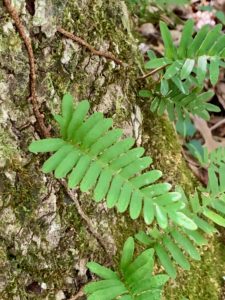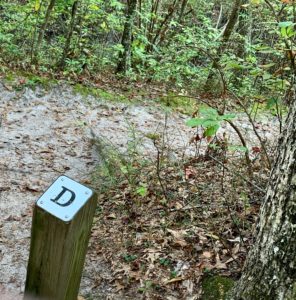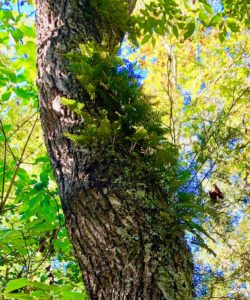By Mary Reid Barrow
The resurrection fern growing on a tree in Meg and Bill Campbell’s yard was a wonderful mystery when I wrote about their beautiful live oak garden at the North End last summer.
I learned about the fern for the first time when I saw it growing on a long, low sturdy live oak tree in the middle of their yard. I had never heard about or seen it before.
Small and unremarkable looking, a resurrection fern becomes a head turner when you find out why it got such a name. This fern is green and lush after a rain, but when the weather is dry, its leaves curl up and it might as well be dead. Then, after it rains again, the fern comes back to life, thus its name, resurrection fern.
A resurrection fern can lose 75 percent of its water before it really dies, while the average plant can lose only 10 percent before it keels over. These ferns don’t borrow water from the tree on which they live. Like Spanish moss and other epiphytes, they use trees only for support, not for nourishment.
Resurrection ferns look like they are growing on a vine, but the vine just snakes along the tree unconnected to any roots below.
I also couldn’t help but wonder how and why the fern is growing, as it is, in the Campbell’s yard at the North End, where you don’t expect to see epiphytes among the garden flora? Did its spores float in on the wind, or arrive on a bird’s foot from nearby First Landing State Park, perhaps?
Yet, I had never seen the fern in First Landing before either. That all changed over the winter when a friend and LRNow volunteer, Lesley Hildreth , noticed it growing on a tree on the Bald Cypress Trail in the park. It was so close to the edge of the trail that I could have brushed by it, but I had never did.
There is even a green trail marker D by the tree where the resurrection fern grows. But you can easily see it, dead or alive if you are looking for it. And that’s a big “if.”
There are a lot of trees with vines, growing, round them and branches with dead leaves attached. So you really have to look!
But it’s worth it to search for this remarkable fern. Look up, not down. If you go after dry weather, you will barely recognize the dead looking leaves on the tree and think I was lying to you! But if you go this weekend after all the rain, you will probably see its green ferny leaves, bright and happy.
Finding something special like that opened my eyes and lo and behold, I was surprised to find cranefly orchids further along on the trail! Once you start looking at foliage in a different way, you also might be surprised to find other unusual native plants and wildflowers in the park.
In fact, the biggest surprise of all occurred not long after our first “discovery,” of resurrection fern. Another trail-walking friend, Terri Gorman, who is the Pearl Home Coordinator for LRNow, began to see more resurrection fern growing in not one but several places in the lower elevations further along on the Bald Cypress Trail!
My mystery is in plain sight.
Do you have a favorite tree or plant with a story to tell? What relationships have you observed between plants and critters? Who eats whom? Who has babies where? Send an email to maryreid@lrnow.org


